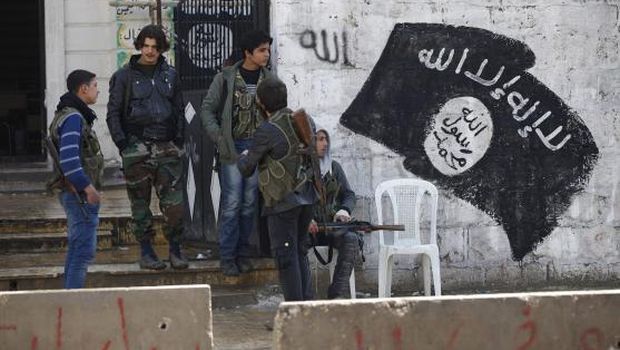
Free Syrian Army fighters stand at a former base used by fighters from the Islamic State in Iraq and Syria (ISIS), after ISIS withdrew from the town of Azaz, near the Syrian–Turkish border, on March 11, 2014. (Reuters/Hamid Khatib)
Beirut, AP—Heavy clashes were underway Monday between several Syrian rebel factions and the Al-Qaeda breakaway group, the Islamic State of Iraq and Syria (ISIS), in a fight for control of a border crossing with Iraq, opposition activists said, just hours after the jihadi group declared the establishment of a transnational Islamic caliphate.
The UK-based Syrian Observatory for Human Rights said fighting between rebel groups and rivals in ISIS is concentrated in the town of Al-Bukamal on the border between Syria and Iraq.
The jihadist group, which on Sunday declared the establishment of an Islamic caliphate, controls much of northeastern Syria. In Iraq, it has recently captured cities and towns as well as border crossings, effectively erasing the frontier.
The group says its Islamic state stretches from northern Syria to the Iraqi province of Diyala northeast of Baghdad, and has called on all Muslims worldwide to pledge allegiance to it.
Last week, beleaguered fighters from the Al-Qaeda-affiliated Al-Nusra Front, which has previously fought ISIS in opposition-held territory in northern and eastern Syria, defected and joined ISIS in Al-Bukamal, effectively handing over the border town to the powerful group, which controls the Iraqi side of the crossing.
Rebel infighting has turned into a war within a war in Syria, three years after the conflict began with largely peaceful protests against President Bashar Al-Assad, whose family has ruled the country for more than four decades.
After the government brutally cracked down on the protest movement, many Syrians took up arms to fight back. As the uprising shifted into a civil war, the Western-backed Free Syrian Army (FSA) emerged—a loose term for a collection of self-formed brigades and defectors from Assad’s military that fight under a nationalist banner.
But Islamist fighters became the dominant force in the armed opposition, ranging from religious-minded Syrians calling for rule by Shari’a law to more extreme Al-Qaeda-inspired fighters.
ISIS, which was at the time Iraq’s Al-Qaeda branch, barged into the Syrian war in 2012, sending in its battle-hardened forces and recruiting foreign jihadists.
Other rebels initially welcomed the jihadists as allies against the Assad government, but soon turned on the group, accusing it of hijacking the uprising for its own transnational goals and imposing a brutal form of Islamic rule in the territories under its control.
Up to 7,000 people, the majority of them fighters, have been killed in the rebel-on-rebel violence across the opposition-held territory in the north since January, according to the Observatory’s tally, which is compiled by its activists on the ground.
